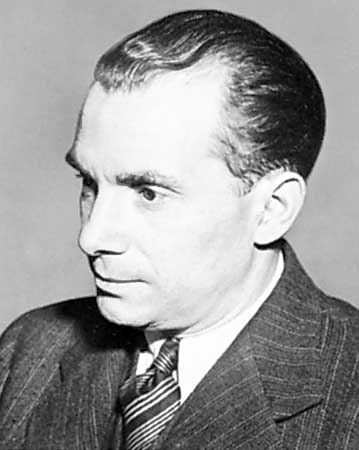Hasenclever, Walter
German writer
born July 8, 1890, Aachen, Ger.
died June 21, 1940, Les Milles, France
 German Expressionist (Expressionism) poet and dramatist whose work is a protest against bourgeois materialism and the war-making state.
German Expressionist (Expressionism) poet and dramatist whose work is a protest against bourgeois materialism and the war-making state.After studying briefly at the Universities of Oxford and Lausanne, Hasenclever in 1909 went to the University of Leipzig, where he turned to literature, philosophy, and history. While serving in the German army during World War I, he feigned mental illness and was discharged. After the war he became interested in mysticism, occultism, and Buddhism. He worked from 1924 to 1928 in Paris as correspondent for a Berlin newspaper, and from 1929 to 1932 he was a scriptwriter for Metro-Goldwyn-Mayer, living in Berlin but traveling frequently throughout Europe and North Africa. After fleeing Nazi Germany in 1933, he eventually went to southern France, where in 1940, confined in an internment camp, he committed suicide.
Hasenclever's first play, Der Sohn (1914; “The Son”), concerning a youth who becomes a political revolutionary and brings about his father's death, became the manifesto for the German post-World War I generation. It was followed by two antiwar plays, Der Retter (1915; “The Saviour”), about a poet who tries to stop the war and is executed by a firing squad, and Antigone (1917), a pacifist-slanted interpretation of Sophocles' play. In his best-known work, Die Menschen (1918; “Humanity”), Expressionist techniques are carried to an extreme form. The characters are symbolic types, speech is reduced to staccato monosyllables, and meaning is conveyed by pantomime and stylized overacting. Later, Hasenclever abandoned the Expressionist style and wrote conventional comedies. He also wrote two novels during his exile in France in the 1930s, both published posthumously.
- Bourg-en-Bresse
- bourgeoisie
- Bourgeois, Louise
- Bourgeois, Loys
- Bourgeois, Léon
- Bourges
- Bourget, Paul
- Bourguiba, Habib
- Bouri
- Bourignon, Antoinette
- Bourke
- Bourke-White, Margaret
- Bourmont, Louis-Auguste-Victor, Count de Ghaisnes de
- Bourne
- Bourne, Francis
- Bourne, Geoffrey
- Bournemouth
- Bourne, Randolph Silliman
- bournonite
- Bournonville, August
- Bourrienne, Louis-Antoine Fauvelet de
- bourrée
- Boursault, Edme
- Bou Saâda
- Bousoño, Carlos